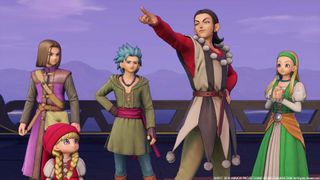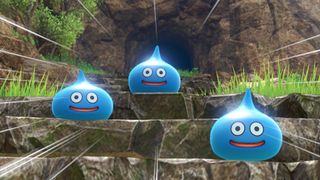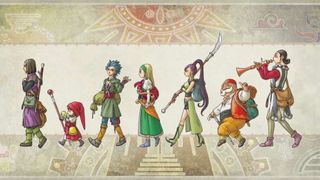Dragon Quest's creator hopes to bring more of the series to PC
In an interview for Dragon Quest 11, Horii reflects on 80s PC history, working with Akira Toriyama, and making a PC game for the West.

Dragon Quest 11 releasing on PC was a major milestone for Japanese PC gaming, and a moment of symmetry: creator Yuji Horii was first inspired by computer games like Ultima and Wizardry, and now his series finally shares a platform with them, all these years later. It's the first, though he hopes it won't be the last. "If Dragon Quest 11 does sell on the PC, hopefully we can bring some of the older games in the series and port them to the PC," Horii said when we spoke in a recent interview.
For Dragon Quest 11, the PC was part of the plan from the very beginning.
I asked Horii, along with Dragon Quest 11's director and producer, about making the first Dragon Quest for PC, and to look back at the PC scene of the 1980s. Would the series have become as popular if it was released for the PC, rather than Nintendo's Famicom?
"There's no saying what could have happened if they had released on a different platform," Horii said. "From the very start of developing Dragon Quest, I only had the Famicom system in mind. It was the gaming device that most children were playing on.

"When you really look back at the state of PCs back then, they were very expensive hardware. Back then I was writing articles for Shonen Jump about PC games like Lode Runner, and oftentimes I would receive surveys or comments from readers saying 'that looks so fun, I want to try playing it.' But PCs were so expensive, kids couldn't play those games. The year after the Famicom came out, and it became more accessible and a lot of children tapped into it. So that was the motivation I had in developing for that platform."
Horii had once wanted to become a manga artist, but was drawn to computers and started to learn programming—partially by playing games like Nobunaga's Ambition, which were still written in BASIC, and reprogramming them to see how they changed.
When he made Dragon Quest with Enix, the company was still largely focused on releasing games for Japanese computers like the NEC PC-98 and Sharp X1. That changed with Dragon Quest's success—but despite being intentionally designed for the Famicom, Enix did still commission ports of the first two games to the MSX, another popular PC. They don't look great.
"At that time, they had quite a lineup for PC software, but when the Famicom came out they started porting some of those PC games to the Famicom, including Door Door and Portopia, which happens to be Horii-san's game," said executive producer Yuu Miyake. "From that they gained the know-how to develop for the Famicom. ... When you look at where the PC was going at that time, when Dragon Quest 1 and 2 were releasing, the PC was still selling quite well. So that's why they decided to do an MSX port. But thereafter, in Japan at least, the Famicom became more of the main console for gaming, and the PC industry shrunk a bit, which is why presumably there wasn't a port thereafter."
PC Gamer Newsletter
Sign up to get the best content of the week, and great gaming deals, as picked by the editors.
Horii and his (then much smaller) team didn't work on those ports themselves, but for Dragon Quest 11, the PC was part of the plan from the very beginning. Historically, Dragon Quest has always been developed for the platform with the most Japanese players. For years that was the Famicom and Super Famicom; then it was the PlayStation, the PlayStation 2, and the Nintendo DS. But times have changed, and Horii said that "in this day and age… when you think of where the biggest market is, at least for North America, we can say it's for PS4 and PC, which is why we're bringing the game to those platforms."
We also chatted a bit about what it's like working with Dragon Ball creator Akira Toriyama, who's been doing art for the Dragon Quest series since the beginning. Typically, the dev team comes up with a description for a character or monster and supplies it to Toriyama, who then sends back a rough line drawing, and they go back and forth from there to refine it. But with every game, Toriyama tends to have something in particular he's unpredictably interested in drawing.
"For Dragon Quest 11, it seemed like Toriyama-san was very particular about the accessories, this time," Dragon Quest 11 director Takeshi Uchikawa said. "For example, the main character's bag, or the way he straps his belt. Those kinds of fine details and ideas were brought up by Toriyama-san, and with the illustrations he creates, the development team would convert that into 3D models. Of course the development team wants to bring his illustration to life as much as possible, so even if they were encountering some difficulties with how characters would move with a specific accessory or whatever, they tried their best to make that come true."

My favorite detail was that when Toriyama drew the game's final boss, he was clearly excited about the design—instead of his usual black-and-white sketch, he turned in a fully colored illustration.
Like Toriyama, Horii's passions have manifested in different ways over the life of the series. Dragon Quest 11 was meant to be a culmination of 30 years of history, and he said he wanted people to feel that progression. Around the development of Dragon Quest 6 on the Super Famicom, the idea of "finding yourself" was popular, so he reflected that theme of self-exploration in the game. And even at the age of 64, he's still a big fan of pranks, which commonly appear in the Dragon Quest games.
An unexpected bit of history came up when Horii spoke of how his childhood influenced Dragon Quest. He didn't go adventuring in the hills as a boy, the way Shigeru Miyamoto did and famously channeled into The Legend of Zelda, but Dragon Quest's collectible mini medal items do have a childhood origin story.
"I actually grew up on a very small island, and there was a small hill on that island and a cliff," Horii said. "We had these small frisbee-like discs. Basically, you would throw them off the cliff, and I would enjoy running down the hill and gathering those. That kind of became the inspiration for the small medallions, the mini medals, in the Dragon Quest games."
While Dragon Quest 11 hasn't lit up the Steam charts like Monster Hunter: World, or matched the PS4 version's great success in Japan, it remains on Steam's top sellers list more than two weeks after release. Time will tell if that's enough to bring the rest of the series, and their mini medals, to the PC as well.

Wes has been covering games and hardware for more than 10 years, first at tech sites like The Wirecutter and Tested before joining the PC Gamer team in 2014. Wes plays a little bit of everything, but he'll always jump at the chance to cover emulation and Japanese games.
When he's not obsessively optimizing and re-optimizing a tangle of conveyor belts in Satisfactory (it's really becoming a problem), he's probably playing a 20-year-old Final Fantasy or some opaque ASCII roguelike. With a focus on writing and editing features, he seeks out personal stories and in-depth histories from the corners of PC gaming and its niche communities. 50% pizza by volume (deep dish, to be specific).
Most Popular


